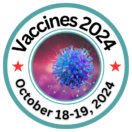3rd International Conference on
Virology and Vaccines
April 18-19,2025 (Online Conference)
Theme: “Exploring the Past, Present, and Future of Virology and Vaccines”
Vaccines 2025 | Webinar
News Updates
Why to Choose Sciencezo Planet Webinar & Conferences
WHAT WE DO?
Sciencezo Planet Conferences organizes conferences, meetings, seminars and workshops with the ingenious and peerless speakers throughout the world providing you and your organization with a broad range of networking opportunities to capitalize on the knowledge of practicing members across several disciplines to understand the impact of science in modern world.
WHO WE ARE?
Sciencezo Planet Conferences provides an opportunity for leading academicians, scientists, researchers, doctors, medical practitioners, nurses and various industry professionals from around the world to network and have scientific discussion on the latest advancements and interlinked domains in science, medicine and health.
WHAT IS OUR VISION?
Sciencezo Planet is proficient in organizing conferences, meetings, seminars and workshops with the ingenious and peerless speakers throughout the world providing you and your organization with a broad range of networking opportunities to globalize your research and create your own identity in the scientific community.
WHAT IS OUR MISSION?
Our main mission is to make our conferences highly successful with high quality interactive technical sessions with recent research findings of the latest and futuristic trends exposed as we focus on providing workshops and symposiums organized through well-established industrial and academic tie-ups with various professional bodies.
Renowned Speakers
xxx
University of Naples
Italy
xxx
RES-Institute
Germany
xxx
Novosibirsk State University, Russia
xxx
Italian Space Agency
Italy
xxx
University of Texas at Austin, USA
xxx
University of Turku
Finland
xxx
Beijing Institute of Technology, China
xxx
Wuhan University
China
xxx
Pforzheim University
Germany
Tecnológico Nacional de México (TecNM), México
xxx
University of Science and Technology, Hong Kong
xxx
International Computer High School of Bucharest, Romania
xxx
Scientific Sessions
Track 1: Coronavirus (COVID-19) Vaccine Research
Track 2: Vaccine Immunology and Immunotherapy
Track 3: Emerging and Re-Emerging Infectious Diseases
Track 4: Cancer Vaccines & Immunotherapy
Track 5: Immuno-Genetics & Immune Tolerance
Track 6: Immune-disorders, Allergy & Asthma and Human Vaccines
Track 7: Epidemiology and Parasitology
Track 8: Influenza and Respiratory Diseases
Track 9: Protein Based Vaccines
Track 10: Veterinary Vaccines, HIV/AIDS Vaccines and Hepatitis Vaccines
Track 11: Antibodies: Engineering & Therapeutics
Track 12: Vaccines Safety, Efficacy & Clinical Trails
Track 13: DNA Vaccines and RNA Vaccines
Track 14: Vaccines Pre-Clinical Validation to Clinical Trials
Track 15: Next-Generation Vaccine Delivery Technologies
Track 16: Novel Approaches & New Trends in Vaccines Development
Track 17: Vaccination Advancement and Immunization
Track 18: Vaccine Policy and Advocacy
Track 19: Vaccines for Pregnant Women & Neonates
Track 20: Ebola and Zika Viral Infections
Important Dates
Conference Dates
- Conference Date: April 18-19,2025
- Abstract Submission Start: December 05, 2024
- Registration Start: December 05, 2024
Abstract Submission Deadline
- First Round Deadline: January 15, 2025
- Second Round Deadline: February 20, 2025
- Final Submission Deadline: March 25, 2025
Registration Deadline
- Early Bird Deadline: January 15, 2025
- Mid Term Registration: February 28, 2025
- Final Registration: March 25, 2025
Registration
Academic
$ 99
- Access to Live Sessions
- Access to All Sessions Online
- E-Certificate
- Advertisement of Organization
- Career Development
- Visibility of your profile
- Creation of one web page
Business
$ 129
- Access to Live Sessions
- Access to All Sessions Online
- E-Certificate
- Advertisement of Organization
- Career Development
- Visibility of your profile
- Creation of one web page
Student
$ 75
- Access to Live Sessions
- Access to All Sessions Online
- E-Certificate
- Advertisement of Organization
- Career Development
- Visibility of your profile
- Creation of one web page
Delegate Listener
$ 99
- Access to Live Sessions
- Access to All Sessions Online
- E-Certificate
- Career Development
Media Partners





